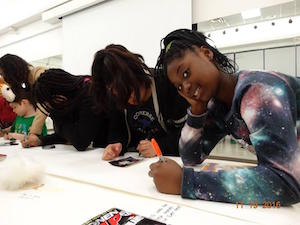
CCE NJ participants at first contact meeting
The Cross Community Engagement (CCE) pilot program launched in July of 2016 with two groups: one African American and the other Latino. In the course of four months, these middle and high school students separately prepared themselves to meet each other through a series of bi-weekly managed pre-contact meetings under the guidance of trained facilitators. The first managed contact meeting was conducted on November 19th by the local CCE leadership team and Dr. Alan Largey and Mr. Barry Fennell of Co-operation Ireland.
During this pre-contact stage, students got to know other members of their group, discovering more about their own identity and culture. This was a conscious effort to prepare them for the first managed contact meeting where they would meet the other racially grouped students. CCE partner and Jersey City Police Detective, Doris Johnson, stated that, “CCE has given Jersey City youth an opportunity to begin the process of understanding through well planned community-based workshops, which encourage them to embrace their differences so they will see they are the same.”
The CCE program engages at-risk youth to participate in a series of workshops, field trips, and activities designed to build cross-cultural relationships. The approach is based on 30 years of success in Belfast, Northern Ireland, working with Protestant and Catholic youth. Locally, Global Peace Foundation has engaged stakeholders including Co-operation Ireland, Federal Administration for Children and Families, and Board of Education and others, to invest 18 months into facilitated community mapping in order to tailor this program to a diverse, American urban setting.

“Personal Icon” activity engages CCE participants.
A very special activity, called “personal icon,” which Co-operation Ireland tested and applied in Belfast, Northern Ireland with local communities, was implemented to present students to each other for the first time. Students brought one “icon” or item that deeply represented themselves. Students placed their items on a paper-covered table, writing down what the icon meant to them and why it was chosen. As the program began all students entered the room, walking around the table and writing their comments on each icon they saw on the table. They took a moment to think of others by looking at each icon and commenting on one icon at a time. During this activity, students naturally began to engage with each other, talking about their icons and reading their comments out loud. Beyond culture, race, and age, CCE students discovered common ground behind the meaning of each other’s icons.
Based on the momentum created out of this first contact activity, Co-operation Ireland leaders led several more activities designed to foster a sense of cohesion between groups of people who usually have very little interaction. By participating in these activities, students challenged themselves to open up their horizons and engage with new friends.
Assistant facilitator of the African American Youth group, Muriel Roberts, shared her experience following the program saying, “I believe most of all that CCE in Jersey City has given me hope for the future. As the youth came together, showing a caring attitude toward each other, it gave me a feeling of hope. There is still much to accomplish, but this is a strong start.”
The CCE pilot program in Jersey City has successfully concluded Phase I and is now moving forward into Phase II where further contact meetings will be implemented over the course of the remaining months of their 18-month trial period. The continuing meetings intend to demonstrate a national model for replication and to measure the empirical impact on identity-based attitudes and behaviors. The foundation of this issue-based collaborative project is proving to make a direct positive impact on the ethnically diverse Jersey City community.
